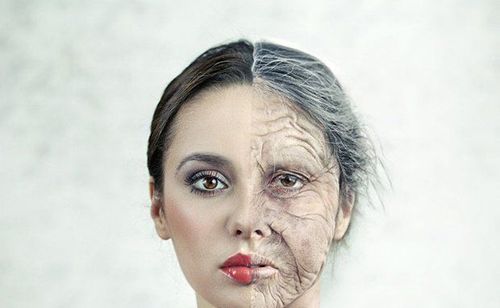This is an automatically translated article.
Menopause can affect a woman in many different ways. There are many people who do not experience any discomfort, there are also many people who experience many symptoms that severely affect their lives.1. Symptoms of Menopause
Menopause is the end of the entire menstrual cycle in a woman. This term can describe any change you experience right before or after you stop menstruating, marking the end of your fertile years.
Most women approaching menopause will experience hot flashes, sudden burning sensations that radiate throughout the upper body, often accompanied by flushing and sweating. These hot flashes range from mild to severe, depending on the person.
Other symptoms include:
Irregular or missed periods Insomnia Mood swings Fatigue Depression Irritability Fast heartbeat Headache

Phụ nữ gần đến thời kỳ mãn kinh thường xuất hiện triệu chứng đau đầu
Muscle soreness Changes in libido Vaginal dryness Problems with bladder control
2. Complications caused by menopause
The loss of estrogen due to menopause is believed to be closely related to the occurrence of a number of health problems that become more common as women age.
After menopause, women are at increased risk for:
Bone loss (osteoporosis) Heart disease Bladder and bowels don't work as they used to Have a higher risk of Alzheimer's Disease More wrinkles appear muscle strength and tone Weaker vision, and diseases such as cataracts (which causes the lens of the eye to become blurry) and macular degeneration (which causes small spots in the center of the retina)

Sau mãn kinh phụ nữ có thể gặp tình trạng da nhăn nhiều hơn
A woman entering menopause early has a higher risk of heart disease and early death, a new analysis shows.
To come to this conclusion, Dutch researchers reviewed 32 studies involving more than 300,000 women. Researchers compared women who were younger than 45 years old at the onset of menopause with those who were 45 years or older when it began.
Overall, the risk of heart disease appears to be 50% higher for women who are under 45 when they enter menopause. Early menopause also seems to increase the risk of death from cardiovascular and other causes. However, the study found an association - not a cause-and-effect relationship - between early menopause and the risk of heart disease and even death.
The study results were published online September 14 in the journal JAMA Cardiology.
"These findings suggest that women who start menopause early are the group of patients who need to take steps to take proactive cardiovascular disease prevention steps," study author Dr. Taulant said. Muka, of Erasmus University Medical Center in Rotterdam, Netherlands.
For women in early or very early menopause, that could be hormone therapy, the researchers said. Long-term use of the hormone estrogen is associated with an increased risk of cancer and stroke. Some experts believe that the risks of this measure outweigh the benefits. “The advice given to women who enter menopause before age 45 is different,” explains JoAnn Manson. She is co-director of the Connors Center for Women's Health and Gender Biology at Brigham & Women's Hospital in Boston.

Liệu pháp hormone thay thế được ứng dụng trong điều trị mãn kinh sớm
One third of women worldwide die from cardiovascular disease. And for reasons that are not entirely clear, this risk increases during menopause. Is this due to the dramatic drop in estrogen levels after menopause? Perhaps it's more complicated than that, said the co-authors of an editorial accompanying the study.
Teresa Woodruff, one of the editorial writers said: "We don't know for sure whether the reproductive system is affecting heart health or if cardiovascular disease is affecting the ovaries." is vice chair of the research committee in obstetrics and gynecology at Northwestern University in Chicago.
Manson, co-author of Teresa, says this link can go both ways: early menopause increases the risk of heart disease and factors like high blood pressure (hypertension) and blood fats ( High cholesterol) can damage the blood vessels that feed the ovaries and lead to early menopause.
Study author Muka, a postdoctoral researcher, offers one possible explanation for the increased risk for women with early menopause: Premature loss of ovarian function may trigger a system in the body that regulates blood pressure, body fluids and inflammation, he says.

Phụ nữ nên định kỳ kiểm tra sức khỏe giúp phát hiện sớm bệnh lý
"Inappropriate activation of this system causes high blood pressure and can damage your heart," says Muka.
It is possible that the risks leading to early menopause and increasing the risk of worsening health are genetic or environmental factors, the researchers added.
Muka and colleagues selected observational studies to analyze a woman's age at onset of menopause as well as the length of time since the onset of menopause.
Only four studies have evaluated the timing of the onset of menopause in relation to cardiovascular disease risks, and the results have been inconsistent.
However, the age-related findings show a clear link, the researchers said. While women with early menopause face an increased risk of cardiovascular disease and earlier death, women aged 50 to 54 who have just started the onset of menopause have a lower risk of fatal heart disease. than under 50 years old.
Based on the findings, "age at menopause may be a predictor of future cardiovascular events and mortality in postmenopausal women," says Muka.
The above findings were published online September 14 in the journal JAMA Cardiology.
Customers can directly go to Vinmec Health system nationwide to visit or contact the hotline here for support.
Articles refer to the source: webmd.com













